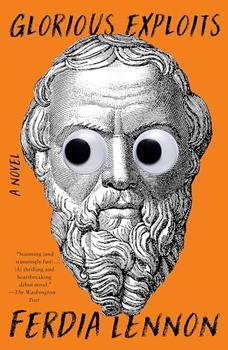Summary | Excerpt | Reviews | Beyond the Book | Read-Alikes | Genres & Themes | Author Bio

A Novel
by Ferdia LennonThis article relates to Glorious Exploits
While it's impossible to determine for sure how ancient Greeks sounded, Ferdia Lennon asserts that, despite what one hears and reads in many works depicting this era, they didn't echo the tones of Oxford scholars. In his novel Glorious Exploits, set in 5th century BCE Sicily, the narrator Lampo converses in a contemporary Hiberno-English, a term that encompasses the dialects of English spoken in Ireland that retain grammatical structures, phonology, and vocabulary derived from Gaelic.
Until the 12th century, Irish Gaelic stood as the sole language of Ireland. The influx of Anglo-Normans introduced Old English to Dublin, yet Gaelic maintained its supremacy until the Tudor conquest in the 16th century. Following this, English ascended to become the standard language of administration and education, while Gaelic suffered suppression and was associated with inferiority. However, English didn't assert full dominance until the 19th century, catalyzed by the Great Famine (1845-1848), which spurred mass emigration to North America. Today, although Irish is recognized as Ireland's national language, merely 39.8% of the population speaks it with "some ability," according to the 2022 census; contrastingly, English, the secondary official language, boasts a 98% prevalence.
As explained by an Oxford English Dictionary article, "the lack of regular schooling for the native Catholic Irish before the 1830s meant that the shift to English occurred without the aid of formal education, and so many features from Irish were carried over." Phonological, grammatical, and terminological disparities differentiate Irish English from Standard English. The Irish vernacular preserves distinct features and "salient structures," such as the ubiquitous use of "ye" or "youse" for the second-person plural. Additionally, Gaelic terms like "sláinte," and Irish-derived expressions such as "gob" (meaning "mouth"), alongside English words with unique Irish usage like "crack" (denoting "fun"), remain integral to everyday discourse. These linguistic nuances infuse the narrative of the characters in Glorious Exploits.
In a piece for LitHub, Lennon shares his intent behind crafting Lampo's voice, aiming to encapsulate the "spirit" of the era. He found resonance in the Irish vernacular, noting "the Sicily of the 5th century BCE had been colonized a few hundred years previously by the city-states of mainland Greece. It struck me that the form of ancient Greek spoken in this colonial Sicily would probably have been a little different. When trying to find a way to render this difference, I didn't have to look very far." Just as vestiges of the native language endure in Ireland's modern discourse post-colonization, Lennon posits that a similar phenomenon may have transpired in pre-Christian Sicily.
By employing this dialect, the author also aims to amplify the voices of excluded figures within Greek society. Lampo, along with Gelon, the novel's co-protagonist, embodies the struggles of an unemployed potter, while the rest of the characters hail from other marginalized groups: slaves, immigrants, and children. Irish English, burdened with a historical stigma of inferiority since Tudor times, serves as a tool for Lennon to depict the diverse social fabric and social differences of his setting: "It was a way to approach the complexity of the past in an immediate and relatable way: to use the present to imagine what it felt to be alive then."
While Lennon's utilization of Hiberno-English in a classical milieu is groundbreaking, it finds precedence in Irish literature. Contemporaries like Donal Ryan, Roddy Doyle, Claire Keegan, Marina Carr, or Sebastian Barry have embraced this dialect, tracing a lineage back to literary luminaries such as James Joyce, who said: "The Irish, condemned to express themselves in a language not their own, have stamped on it the mark of their own genius."
Filed under Places, Cultures & Identities
![]() This "beyond the book article" relates to Glorious Exploits. It originally ran in May 2024 and has been updated for the
March 2025 paperback edition.
Go to magazine.
This "beyond the book article" relates to Glorious Exploits. It originally ran in May 2024 and has been updated for the
March 2025 paperback edition.
Go to magazine.
Your guide toexceptional books
BookBrowse seeks out and recommends the best in contemporary fiction and nonfiction—books that not only engage and entertain but also deepen our understanding of ourselves and the world around us.